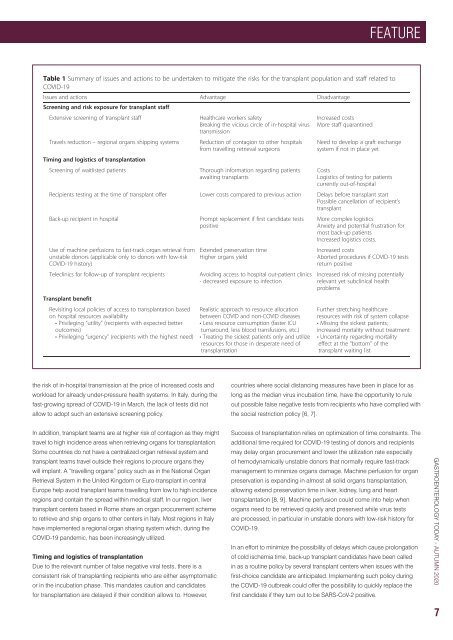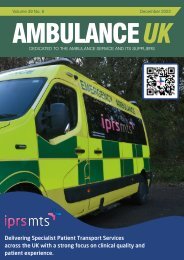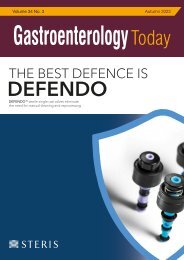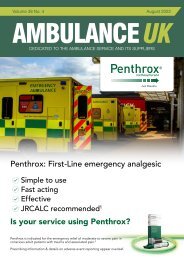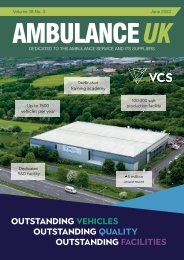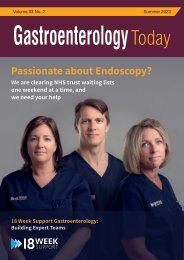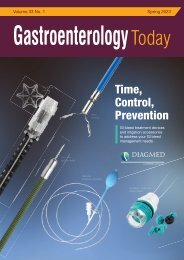Gastroenterology Today Autumn 2020
You also want an ePaper? Increase the reach of your titles
YUMPU automatically turns print PDFs into web optimized ePapers that Google loves.
FEATURE<br />
Table 1 Summary of issues and actions to be undertaken to mitigate the risks for the transplant population and staff related to<br />
COVID-19<br />
Issues and actions Advantage Disadvantage<br />
Screening and risk exposure for transplant staff<br />
Extensive screening of transplant staff<br />
Travels reduction – regional organs shipping systems<br />
Timing and logistics of transplantation<br />
Screening of waitlisted patients<br />
Healthcare workers safety<br />
Breaking the vicious circle of in-hospital virus<br />
transmission<br />
Reduction of contagion to other hospitals<br />
from travelling retrieval surgeons<br />
Thorough information regarding patients<br />
awaiting transplants<br />
Increased costs<br />
More staff quarantined<br />
Need to develop a graft exchange<br />
system if not in place yet<br />
Costs<br />
Logistics of testing for patients<br />
currently out-of-hospital<br />
Recipients testing at the time of transplant offer Lower costs compared to previous action Delays before transplant start<br />
Possible cancellation of recipient’s<br />
transplant<br />
Back-up recipient in hospital<br />
Use of machine perfusions to fast-track organ retrieval from<br />
unstable donors (applicable only to donors with low-risk<br />
COVID-19 history)<br />
Teleclinics for follow-up of transplant recipients<br />
Transplant benefit<br />
Revisiting local policies of access to transplantation based<br />
on hospital resources availability<br />
• Privileging “utility” (recipients with expected better<br />
outcomes)<br />
• Privileging “urgency” (recipients with the highest need)<br />
Prompt replacement if first candidate tests<br />
positive<br />
Extended preservation time<br />
Higher organs yield<br />
Avoiding access to hospital out-patient clinics<br />
- decreased exposure to infection<br />
Realistic approach to resource allocation<br />
between COVID and non-COVID diseases<br />
• Less resource consumption (faster ICU<br />
turnaround, less blood transfusions, etc.)<br />
• Treating the sickest patients only and utilize<br />
resources for those in desperate need of<br />
transplantation<br />
More complex logistics<br />
Anxiety and potential frustration for<br />
most back-up patients<br />
Increased logistics costs.<br />
Increased costs<br />
Aborted procedures if COVID-19 tests<br />
return positive<br />
Increased risk of missing potentially<br />
relevant yet subclinical health<br />
problems<br />
Further stretching healthcare<br />
resources with risk of system collapse<br />
• Missing the sickest patients;<br />
increased mortality without treatment<br />
• Uncertainty regarding mortality<br />
effect at the “bottom” of the<br />
transplant waiting list<br />
the risk of in-hospital transmission at the price of increased costs and<br />
workload for already under-pressure health systems. In Italy, during the<br />
fast-growing spread of COVID-19 in March, the lack of tests did not<br />
allow to adopt such an extensive screening policy.<br />
countries where social distancing measures have been in place for as<br />
long as the median virus incubation time, have the opportunity to rule<br />
out possible false negative tests from recipients who have complied with<br />
the social restriction policy [6, 7].<br />
In addition, transplant teams are at higher risk of contagion as they might<br />
travel to high incidence areas when retrieving organs for transplantation.<br />
Some countries do not have a centralized organ retrieval system and<br />
transplant teams travel outside their regions to procure organs they<br />
will implant. A “travelling organs” policy such as in the National Organ<br />
Retrieval System in the United Kingdom or Euro-transplant in central<br />
Europe help avoid transplant teams travelling from low to high incidence<br />
regions and contain the spread within medical staff. In our region, liver<br />
transplant centers based in Rome share an organ procurement scheme<br />
to retrieve and ship organs to other centers in Italy. Most regions in Italy<br />
have implemented a regional organ sharing system which, during the<br />
COVID-19 pandemic, has been increasingly utilized.<br />
Timing and logistics of transplantation<br />
Due to the relevant number of false negative viral tests, there is a<br />
consistent risk of transplanting recipients who are either asymptomatic<br />
or in the incubation phase. This mandates caution and candidates<br />
for transplantation are delayed if their condition allows to. However,<br />
Success of transplantation relies on optimization of time constraints. The<br />
additional time required for COVID-19 testing of donors and recipients<br />
may delay organ procurement and lower the utilization rate especially<br />
of hemodynamically unstable donors that normally require fast-track<br />
management to minimize organs damage. Machine perfusion for organ<br />
preservation is expanding in almost all solid organs transplantation,<br />
allowing extend preservation time in liver, kidney, lung and heart<br />
transplantation [8, 9]. Machine perfusion could come into help when<br />
organs need to be retrieved quickly and preserved while virus tests<br />
are processed, in particular in unstable donors with low-risk history for<br />
COVID-19.<br />
In an effort to minimize the possibility of delays which cause prolongation<br />
of cold ischemia time, back-up transplant candidates have been called<br />
in as a routine policy by several transplant centers when issues with the<br />
first-choice candidate are anticipated. Implementing such policy during<br />
the COVID-19 outbreak could offer the possibility to quickly replace the<br />
first candidate if they turn out to be SARS-CoV-2 positive.<br />
GASTROENTEROLOGY TODAY - AUTUMN <strong>2020</strong><br />
7


